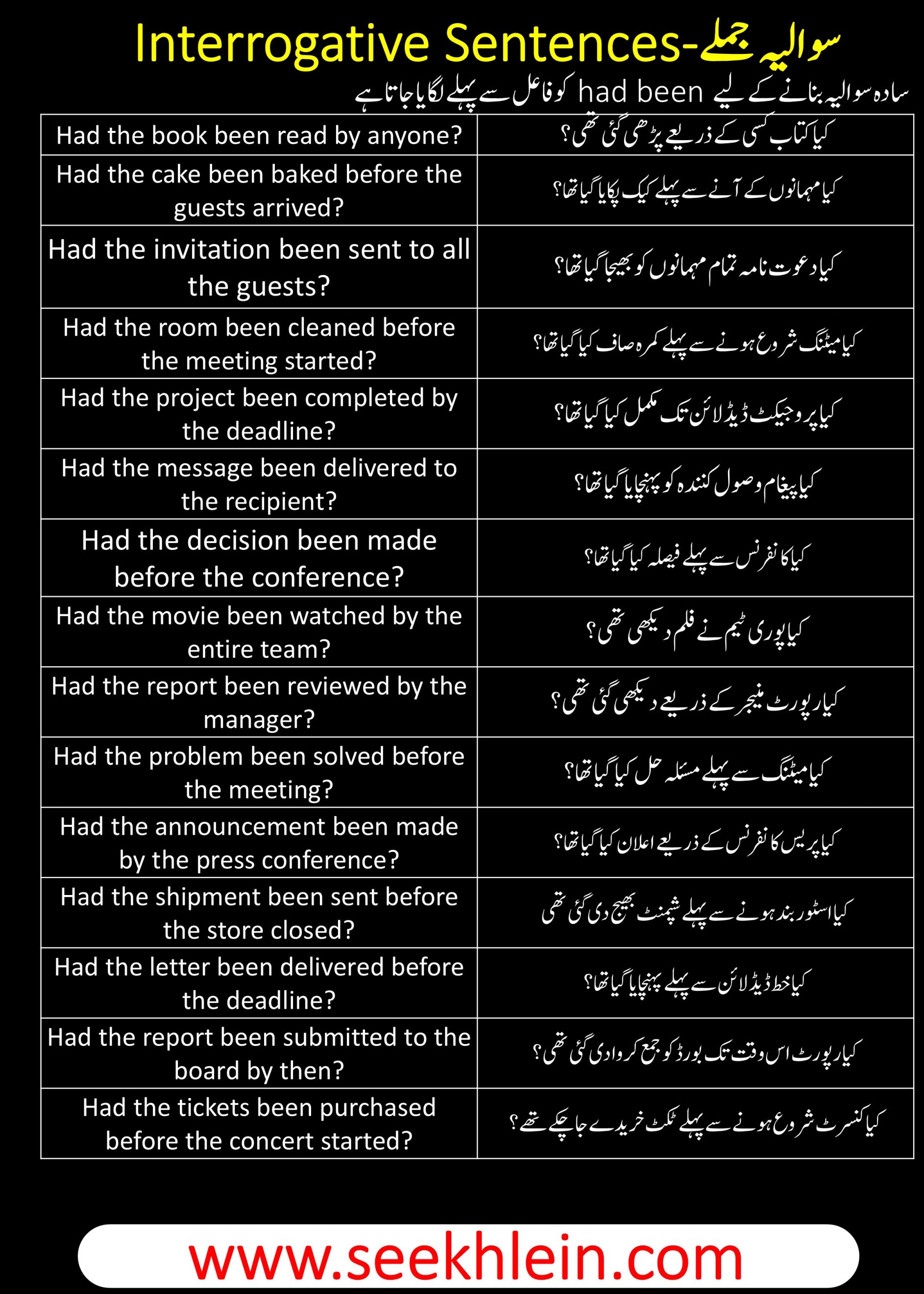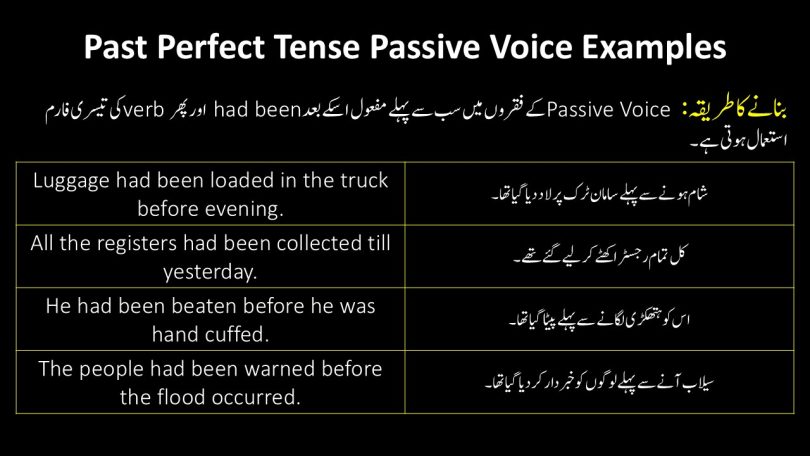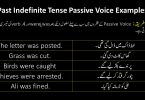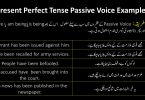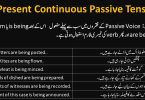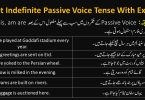Introduction:
In this blog, you will learn Past Indefinite Tense with Urdu To English Examples. If you are a beginner and want to improve your English grammar, you must learn tense. Tenses are key to the English language, without learning Tenses you can’t improve your English grammar and speaking. There are a total of 8 Passive tenses in English grammar. In the first section, you will learn the Past Perfect Passive tense introduction. In 2nd section, you will learn simple sentences of Past perfect passive voice tense. In 3rd section, you will learn negative sentences of the Past perfect Passive tense with Urdu Examples. In the 4th section of this blog, you will learn Past Perfect Passive Voice Interrogative sentences with Urdu to English examples.
Past Perfect Passive Tense With Urdu To English Examples
بنانے کا طریقہ: Passive Voice کے فقروں میں سب سے پہلے مفعو ل اسکے بعدhad been پھر verb کی تیسری فارم استعمال ہوتی ہے
Past Perfect Passive Voice Tense With Simple Sentences Examples
In the table below, you will learn past perfect passive voice tenses with simple Urdu to English sentences. Just scroll down and learn these sentences.
| Luggage had been loaded in the truck before evening. | شام ہونے سے پہلے سامان ٹرک پر لاد دیا گیا تھا۔ |
| All the registers had been collected till yesterday. | کل تما م رجسٹر اکھٹے کر لیے گئے تھے۔ |
| He had been beaten before he was handcuffed. | اس کو ہتھکڑی لگانے سے پہلے پیٹا گیا تھا۔ |
| The people had been warned before the flood occurred. | سیلاب آنے سے پہلے لوگوں کو خبردار کر دیا گیا تھا۔ |
| The booking office had been opened before the train started. | گاڑی روانہ ہونے سے پہلے ٹکٹ گھر کھولا جاچکا تھا۔ |
| The picture had been completed till 5 o’clock. | 5 بجے تک تصویر مکمل ہو چکی تھی۔ |
| Food had been prepared before noon. | کھانا دوپہر سے پہلے تیا ر ہو چکا تھا۔ |
| The trader had been looted before he made a noise. | تاجر کے شور مچانے سے پہلے اس کو لوٹ لیا گیا۔ |
| Fire had been lit before the nightfall. | رات ہونے پہلے آگ جلائی چکی تھی۔ |
| The murderer had been hanged before his relatives arrived. | رشتہ داروں کے آنے سے پہلے قاتل کوپھانسی دی جا چکی تھی۔ |
| Both the men had been arrested before the fight took place. | لڑائی ہونے سے پہلے دونوں آدمیوں کو گرفتار کر لیا گیا تھا۔ |
| All the fruit had been picked before March. | مارچ ہونے سے پہلے سارا پھل چن لیا گیا تھا۔ |
| The fire had been put out before the people came. | لوگوں کو خبر ہونے سے پہلے آگ بھجائی جا چکی تھی۔ |
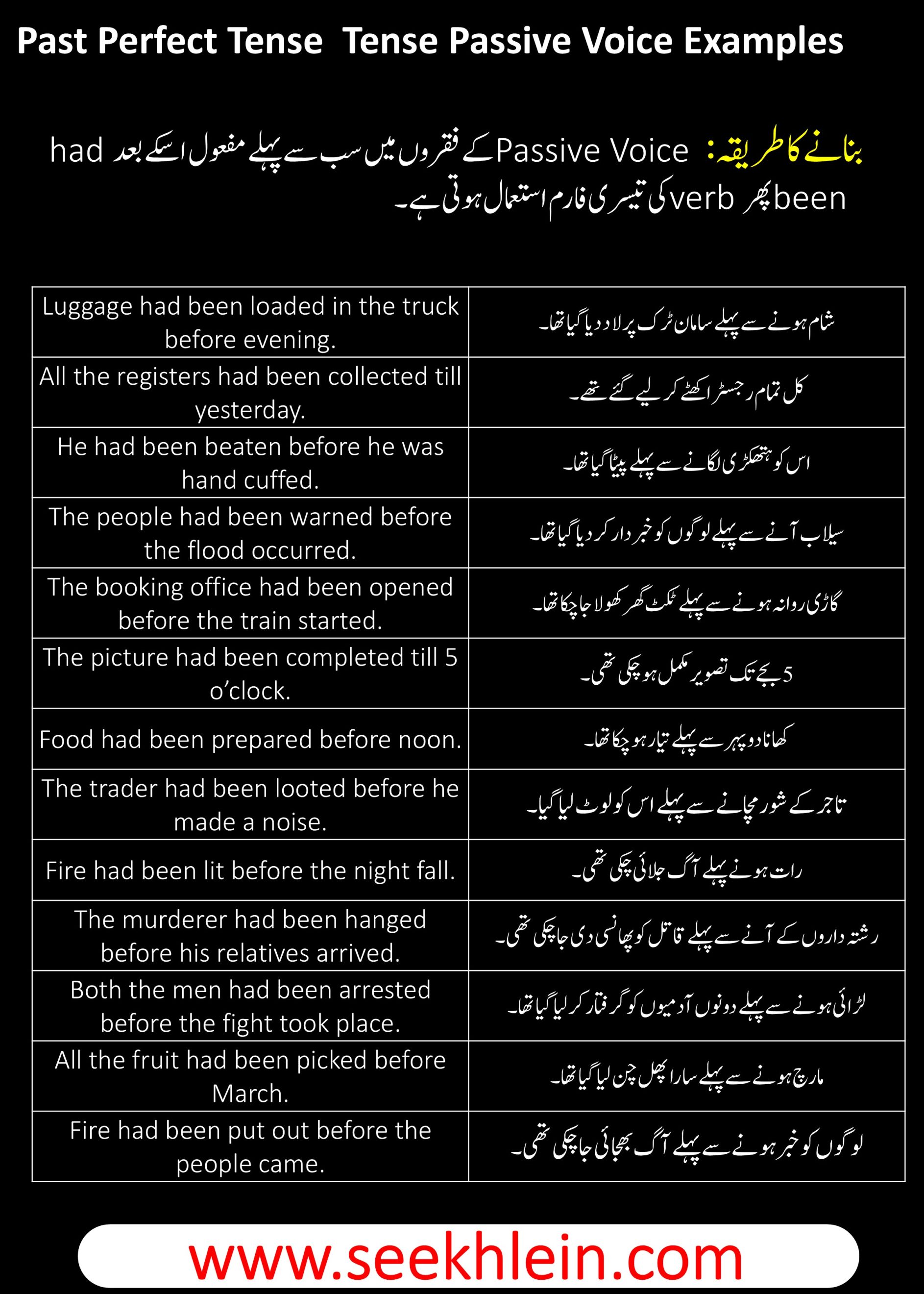
Past Perfect Passive Voice Tense With Simple Sentences Examples
Past Perfect Passive Voice Tense With Negative Sentences Examples
In the table below, you will learn to past perfect Passive Voice Negative Sentences with Simple Urdu to English sentences. Just scroll down and learn these sentences
Negative Sentences-منفی جملے
منفی بنانے کے لیےhadکے بعد not کا استعمال کیا جاتا ہے۔
| The book had not been read by anyone. | کتاب کسی کے ذریعے نہیں پڑھی گئی تھی۔ |
| The cake had not been baked before the guests arrived. | مہمانوں کے آنے سے پہلے کیک نہیں پکایا گیا تھا۔ |
| The invitation had not been sent to all guests. | دعوت نامہ تمام مہمانوں کو نہیں بھیجا گیا تھا۔ |
| The room had not been cleaned by the time the meeting started. | جب میٹنگ شروع ہوئی تو کمرہ صاف نہیں کیا گیا تھا۔ |
| The project had not been completed despite the deadline. | ڈیڈ لائن کے باوجود پروجیکٹ مکمل نہیں کیا گیا تھا۔ |
| The message had not been delivered to the recipient. | پیغام وصول کنندہ کو نہیں پہنچایا گیا تھا۔ |
| The decision had not been made before the conference. | کانفرنس سے پہلے فیصلہ نہیں کیا گیا تھا۔ |
| The movie had not been watched by the entire team. | پوری ٹیم نے فلم نہیں دیکھی تھی۔ |
| The report had not been reviewed by the manager. | رپورٹ منیجر کے ذریعے نہیں دیکھی گئی تھی۔ |
| The problem had not been solved by anyone. | مسئلہ کسی کے ذریعے حل نہیں کیا گیا تھا۔ |
| The letter had not been written by the time the meeting ended. | جب میٹنگ ختم ہوئی تو خط نہیں لکھا گیا تھا۔ |
| The car had not been repaired before the trip. | سفر سے پہلے گاڑی کی مرمت نہیں کی گئی تھی۔ |
| The package had not been delivered to the correct address. | پیکج صحیح پتے پر نہیں پہنچایا گیا تھا۔ |
| The arrangements had not been made for the event. | تقریب کے لیے انتظامات نہیں کیے گئے تھے۔ |
| The documents had not been signed by the manager. | دستاویزات منیجر کے ذریعے دستخط نہیں کیے گئے تھے۔ |
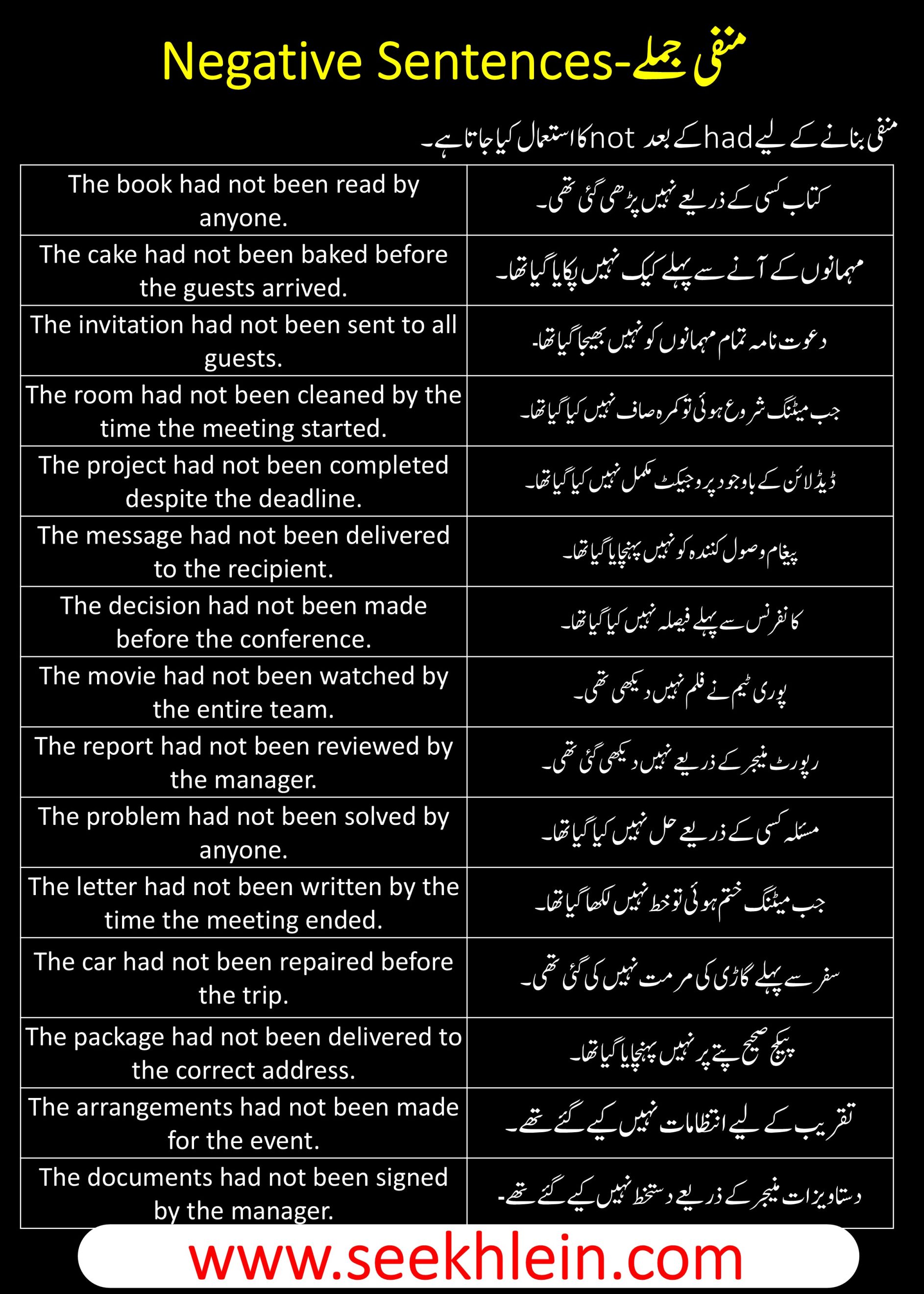
Past Perfect Passive Voice Tense With Negative Sentences Examples
Interrogative Sentences-سوالیہ جملے
سادہ سوالیہ بنانے کے لیے had been کو فاعل سے پہلے لگایا جاتا ہے
| Had the book been read by anyone? | کیا کتاب کسی کے ذریعے پڑھی گئی تھی؟ |
| Had the cake been baked before the guests arrived? | کیا مہمانوں کے آنے سے پہلے کیک پکایا گیا تھا؟ |
| Had the invitation been sent to all the guests? | کیا دعوت نامہ تمام مہمانوں کو بھیجا گیا تھا؟ |
| Had the room been cleaned before the meeting started? | کیا میٹنگ شروع ہونے سے پہلے کمرہ صاف کیا گیا تھا؟ |
| Had the project been completed by the deadline? | کیا پروجیکٹ ڈیڈ لائن تک مکمل کیا گیا تھا؟ |
| Had the message been delivered to the recipient? | کیا پیغام وصول کنندہ کو پہنچایا گیا تھا؟ |
| Had the decision been made before the conference? | کیا کانفرنس سے پہلے فیصلہ کیا گیا تھا؟ |
| Had the movie been watched by the entire team? | کیا پوری ٹیم نے فلم دیکھی تھی؟ |
| Had the report been reviewed by the manager? | کیا رپورٹ منیجر کے ذریعے دیکھی گئی تھی؟ |
| Had the problem been solved before the meeting? | کیا میٹنگ سے پہلے مسئلہ حل کیا گیا تھا؟ |
| Had the announcement been made by the press conference? | کیا پریس کانفرنس کے ذریعے اعلان کیا گیا تھا؟ |
| Had the shipment been sent before the store closed? | کیا اسٹور بند ہونے سے پہلے شپمنٹ بھیج دی گئی تھی |
| Had the letter been delivered before the deadline? | کیا خط ڈیڈ لائن سے پہلے پہنچایا گیا تھا؟ |
| Had the report been submitted to the board by then? | کیا رپورٹ اس وقت تک بورڈ کو جمع کروا دی گئی تھی؟ |
| Had the tickets been purchased before the concert started? | کیا کنسرٹ شروع ہونے سے پہلے ٹکٹ خریدے جا چکے تھے؟ |
